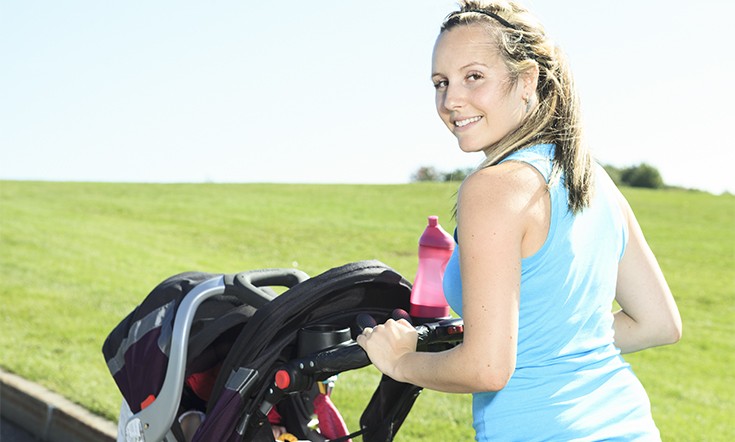

When you bring your baby home from hospital the last thing you may feel like doing is exercising but it does have it’s benefits. A post birth workout (light exercise) can boost your mood by increasing the levels of feel good chemicals in your brain and improves your strength and stamina, which will help looking after your newborn easier.
If you did regular exercise during your pregnancy and had an uncomplicated birth you should be ready to start light exercises and stretching straight after birth.
Doctors recommend that new mum’s who had a C Section, an assisted birth or experienced complications during birth, should wait until their 6 week check up to be given a safe go ahead. Most importantly, though, listen to your body.
Light walking is a great place to start exercising. Getting out and about makes you feel better and is a gentle exercise. After the high of bringing baby home, many mum’s experience “Baby Blues” or run out of energy. Light exercise followed by a well earned rest can help keep sad feelings away and energy up.
Sometimes, it helps to set some goals – start with short walks of 10 minutes and build up to 20 minutes.
Studies have shown that exercise helps the quality of sleep you will have and with a new born, its quality not quantity that counts!
Pelvic Floor Exercises
Pelvic floor exercises can also begin in the first six weeks after giving birth. Strengthening you pelvic floor will protect you from accidental urine leaks and will also help your perineum and vagina heal quicker. This is because the exercises improve circulation in the area and reduce swelling and bruising. Pelvic floor exercises also engage your lower tummy muscles to support your back and pelvis and help tone your belly. Longer term, firming up your pelvic floor will also make sex after birth more enjoyable. Woo Hoo!
In the first few weeks after birth, it’s hard to make time for yourself around babies routine and sometimes you might simply feel too tired for a workout. Don’t leave it on the back burner, try to do what you can. Schedule time for physical activity by asking your partner or others to mind the baby or exercise with a friend to keep motivated. By keeping your exercise plan simple you can also keep baby with you while you exercise, in the pram while you walk or lying next to you as you do your pelvic floor exercises.
After your six week check up your Doctor may suggest that you are ready increase your exercise program. There are thousands of “get back to your pre baby body in record time” blogs and videos on the internet that you may like to consider. Be careful though, remember that your body still needs time to heal.
Abdominal Separation
After birth, your ligaments and joints will still be loose for about 3 – 5 months so be careful to avoid strains or falling. Some women develop a gap in their abdominal muscles as their belly expands during pregnancy and labour called diastasis recti (DRAM). It takes 4 – 8 weeks for this gap to close after birth. If you start doing abdominal exercises before this gap has closed you risk injuring those muscles. It is also important to wear supportive clothing to provide comfort for you while exercising. Some women wear sports bras over their nursing bra for extra support.
Will Exercise affect My Breast Milk Supply?
Some women are concerned that exercise will affect their breast milk. Current studies suggest that this is not the case and exercise has no effect on breast milk volume or composition. Some research however has shown that high intensity physical activity can cause lactic acid to accumulate in breast milk and produce a sour taste that your baby may not like. If intensive exercise is a priority for you in the first few months of breastfeeding consider pumping milk before your workout or avoid feeding baby straight after your exercise session. After months 4 – 5 of breastfeeding, physical activity has less impact on breast milk because your body produces most milk at feeding time.
A safe way to increase your exercise routine is to look out for post partum exercise classes in your area. Many gyms and yoga studios offer specialised classes for new mums or low impact classes that focus on strengthening and toning.
Exercise is important for everyone, especially new mum’s. The important thing is finding the right balance between the benefits from exercising and allowing your body time to heal.






















